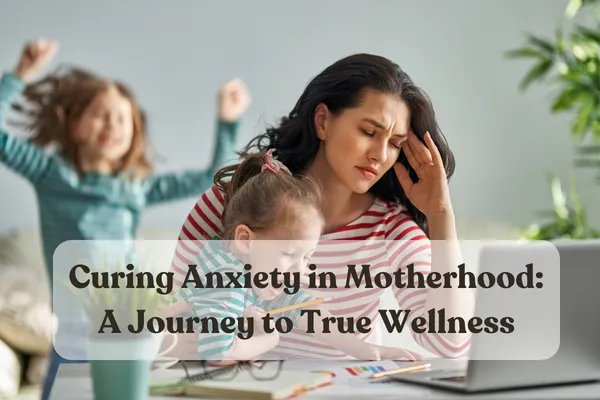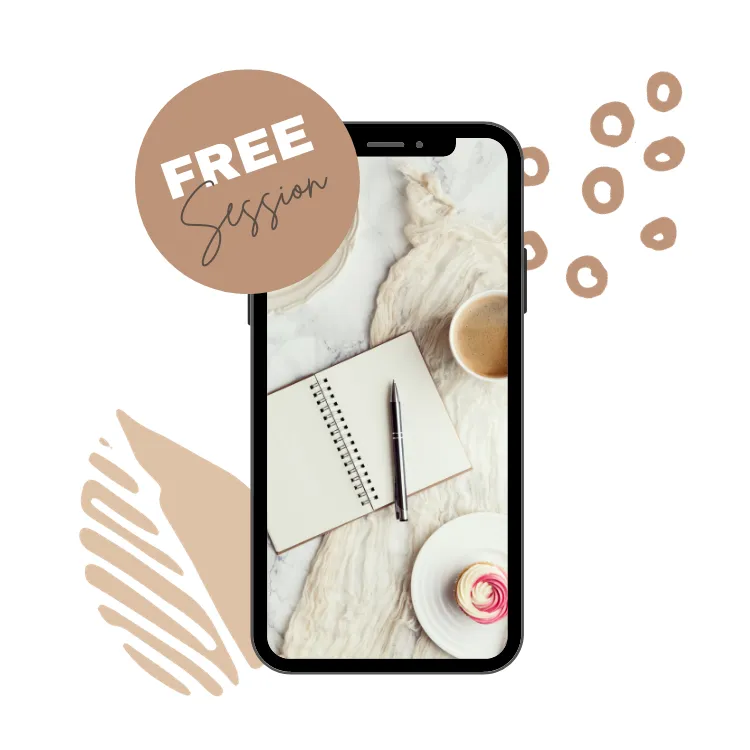BLOG
Taking back control, one day at a time

Curing Anxiety in Motherhood: A Journey to True Wellness
Curing anxiety can appear to be beyond challenging especially for mothers. The overwhelming feelings of anxiety can often heighten other emotions, making it harder to navigate daily life. While I can’t guarantee complete freedom from anxiety, I can assure you that by adjusting your habits, you can gain better control over it.
Read on to discover how your thoughts, your support system, and your actions can significantly influence how your anxiety presents itself and find ways to manage it effectively.

Curing Anxiety
Effects on anxiety
As mothers we are often faced with huge responsibilities and full plates, making it easy to ignore or miss symptoms of anxiety. But it is vital to be able to recognize the typical symptoms of anxiety.
Typical symptoms of anxiety are excessive worry, sweating, fatigue, anticipating something happening, feelings of uneasiness, increased heart rate, and shallow breathing that may make it difficult for you to catch your breath.
Anxiety has the ability to have many effects on our mind and body.
When it comes to our mind, anxiety has the ability to impair our thinking and how we see things. Clouding our mind, making it harder for us to think clearly and with logic.
In the times when feeling anxious you may find yourself overthinking. Overthinking usually leads us to delay doing the things we may want to do.
With overthinking our brain may also create stories that may have an even worse effect, making anxiety worse.
These mental narratives can trigger even more negative effects on our behavior and physical wellbeing, making it necessary to understand how to manage and overcome anxiety for our own sake and our family.
Curing anxiety with medication
There are a number of different ways anxiety can be managed.
In some instances, overwhelming anxiety may call for medication.
In order to use medication as a method to manage your anxiety, you’ll have to reach out to your doctor or a psychiatrist. Your treating medical professional will collect information such as your recent symptoms, your family history, and pertinent information to help them make the best medical decision.
Your doctor will make a well-informed decision and decide whether medication is a good option. Some doctors may be inclined to suggest other options such as psychotherapy (talking with a therapist) or other natural options before prescribing.
Anxiety can be better managed with the help of medication. But medication is not a “fix-all”. It is meant to aid to decrease some of the anxiety.
If the medication was the end-all-be-all, then there would be no need for therapists, interventions, or coping strategies to manage anxiety.
However, if you’re prescribed medication, just keep in mind that it takes time to work. Oftentimes, people give up on medications before they’ve had time to see its full effects.
Be patient with yourself and be honest with your doctor. Together, you’ll be able to discover what works best for you.

Curing anxiety by seeking therapy
Going to therapy can be a very effective way to manage your anxiety and helping you to get to a place where you’ll eventually be able to manage it on your own.
It is important that you are open with your therapist and you’re open to the process in order to get the most out of it.
When working with anxiety, your therapist is likely to use therapeutic approaches that focus on how you think. Your therapist will help you to become more aware of the way you think and how your thinking supports your anxiety.
Sometimes when we start learning things about ourselves, it is uncomfortable. It may feel natural to want to stop that feeling of uncomfortableness but if you fight through it, you’ll come out of it stronger and better for it.
Curing anxiety with changing habits
There are a variety of things that we do when we feel anxious. In many cases, the things we do can be pretty harmful and usually creates more anxiety in us.
Unhelpful thinking patterns
When anxious you may find yourself having more distorted thoughts. Such as thinking with catastrophic lens and your thoughts make you believe the worst.
Catastrophic thinking can be so harmful.
I’ll share with you how catastrophic thinking has affected me. There have been times when I would wake up tired and just not ready to start my day. Then, I’d bump my foot on my bed frame and think “this must be a sign of how my day is going to go”.
Starting with the mindset that I was going rough day because it started off rough is a form of catastrophic thinking.
I wasn’t going to have a bad day because I hit my toe and because my morning was rough, it was because I was feeding my mind with negativity and also looking for more bad things throughout my day to support my original thought that it was going to be a horrible day.
As soon as I started telling myself different things I had a different outlook. I started saying, “Yes, I’m having a rough morning, but I’m determined to have a good day”. That change of outlook has helped me to have many great days even when I did have rough moments throughout the day. It’s all about learning how to reset yourself and changing your perspective.
Curing anxiety with the support of others
You may feel more inclined to want to be to yourself when you feel anxious. Isolating and being completely to yourself can make anxiety worse.
For starters, isolation increases the feelings of being lonely. Feeling lonely increases other unpleasant feelings such as sadness and emptiness, and it can create lasting feelings of depression too.
When we are left to ourselves, we are more likely to entertain thoughts that may not be healthy or helpful. Doing this can make anxiety worse.
Having a trusted person you can talk to can help give you support and an avenue of connection. Being connected to others can help us combat anxiety and other unpleasant emotions.

Curing anxiety with what you do
It is essential that we are aware of what we listen to and watch because they have effects on our moods and thoughts.
It helps to be mindful when watching videos, movies, etc. Ask yourself, how do I feel when I’m watching this? If you notice when watching or listening to a specific something it makes you feel a certain way, take note of it.
For example, suspense movies are meant to keep us on edge and make us wonder. It has the ability to make our anxiety worse because of how that genre is designed.
When I am feeling anxious, I am likely to avoid genres that give me an uneasy feeling and I’ll look for something light-hearted and funny.
Both music and movies/videos have a huge influence on our thoughts and emotions. Due to their influence, it is helpful to pay close attention to their effects. Consuming things that are harmful to us will eventually manifest in our thoughts and behaviors.
Closing thoughts
As mothers, it is also important to work through our anxiety and find healthy ways to manage because it will impact our children. Our kids can easily pick up on similar struggles with feelings such as anxiety, but they also pick up on how to cope as well.
There is no easy fix when it comes to curing anxiety. Anxiety is a normal and natural part of our lives but there are times when it can become unbearable, and it can affect day-to-day living.
In the cases that it is so harmful to the point it impedes day-to-day function, just remember there is help out there. There are therapists and doctors who can help you with managing your anxiety, while you’re learning to do it for yourself.
Changing habits that support anxiety can be difficult but it’s necessary when combating anxiety. It’s not easy but it’ll be worth it. I believe in you! And in the meantime, I’m wishing you good mental wellness.

MINDFULNESS WITH ME
Come rejuvenate your mind with me.
Sign up for a FREE mindfulness session where we will practice mindfulness through meditation and journaling every last Sunday of the month.
© Copyright 2023 Naturally Anxious